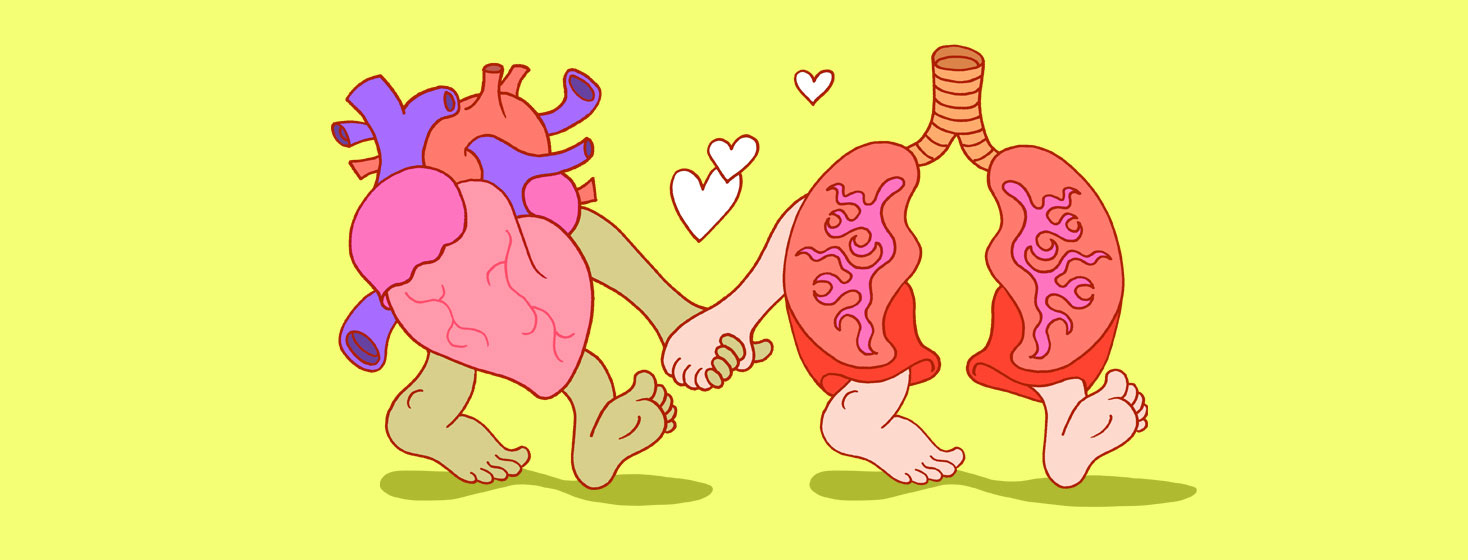3 Theories Explaining Links Between Heart Failure and COPD
Many people with heart failure live with another health condition. There are some people in this community who have both heart failure (HF) and COPD. Studies indicate that about 30% of people living with HF also have COPD. Likewise, about 20% of people living with COPD also have HF. Also, the risk of people living with COPD developing HF is 4.5 times higher compared to people who do not have COPD.1 So, what do researchers think is responsible for this link? Let’s investigate some theories.
Pulmonary hypertension theory
Oxygen levels
People with moderate to severe COPD develop regions inside their lungs where airways are severely or completely obstructed. These areas are poorly ventilated, yet there are also regions where airways are less obstructed or not obstructed at all. These areas are better ventilated.1-4
Our bodies are very good at compensating, or trying to fix these types of problems. Blood vessels constrict, leading to poorly ventilated areas. This works to shunt unoxygenated blood to areas that are better ventilated which is an attempt to maintain normal oxygen levels despite COPD.1-4
Heart changes
When blood vessels are constricted, your heart has to work harder to pump blood through them which causes your blood pressure to increase. When blood vessels in your lungs are chronically constricted, this causes what is known as pulmonary hypertension. This is a phenomenon that sometimes develops in people with severe COPD. One study showed that 33% of those with severe COPD had pulmonary hypertension.1-4
After years of working hard to pump blood through diseased lungs, your heart changes. Your heart is a muscle. Like any muscle that is overworked, it can get big. When your heart gets larger it is called hypertrophy. The right side of your heart is responsible for pumping blood through your lungs and it can become hypertrophied. This makes it a less effective pump. A diagnosis of right-sided heart failure is made. Right-sided heart failure eventually causes left-sided heart failure.1-4
This sequence of changes is what causes heart failure in COPD, or so this theory goes.
Systemic inflammation theory
Role of cells
This is a newer theory. It’s a theory that developed after years of studying human genetics. You see, every cell of our body has a copy of all our genes. Genes release proteins, and these proteins tell cells what to do. Some of these cells are immune cells. Immune cells release proteins that tell other immune cells what to do.1
Immune cells release inflammatory proteins and chemicals. These chemicals are responsible for causing airway inflammation in COPD. Sometimes these chemicals are referred to as mediators of inflammation. A newer term for these chemicals is cytokines. As you read about this subject you may hear any of these terms used.1 These chemicals may also get into your blood system which can cause changes along walls of blood vessels leading to atherosclerosis, heart disease, and heart failure. They may also impact your heart by causing changes there.1
Inflammatory chemicals
Researchers have linked one of these chemicals to COPD and heart failure. The name of the chemical is C-Reactive Protein (CRP). It is responsible for inflammation in COPD but researchers think it also makes its way into your blood system and to your heart. Here it may cause changes to your heart that eventually lead to heart disease and heart failure.
This C-Reactive Protein may also be responsible for heart arrhythmias that are also sometimes seen in COPD patients. One such arrhythmia is atrial fibrillation. A second inflammatory chemical that may be responsible for the link is 8-isoprostane. This is another chemical researchers are investigating.
Other theories
Both diseases are linked to aging. The link may also be explained by chronic exposure to airborne pollutions, such as cigarette smoke or chemicals or fumes in the air at your work.
The link may also be obstructive sleep apnea (OSA), which is another comorbidity that many in the COPD community have. A term for having both COPD and OSA is "COPD Overlap Syndrome." It is thought that OSA may cause hypertension, leading to heart diseases such as atherosclerosis. Of course, OSA may also be associated with increased inflammatory chemicals, which may get into your blood system and impact your heart.
More research needed
Researchers do not know for certain why some people have both COPD and heart failure but these theories give them something to work with. Perhaps someday they may find a medicine that blocks the effects of CRP and 8-isoprostane, thereby preventing people with COPD from developing HF.
In the meantime, researchers are well aware of the link. In those with heart failure, they know it is important to monitor them for signs of COPD. Likewise, they know it is important to monitor for signs of heart failure in those who have COPD. In people with both diseases, controlling one means controlling the other.

Join the conversation